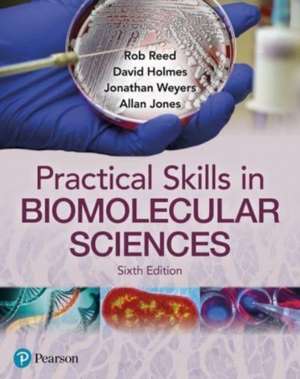Practical Skills in Biomolecular Science
Autor Allan Jones, David Holmes, Jonathan Weyers, Rob Reeden Limba Engleză Paperback – 22 dec 2021
Preț: 407.28 lei
Nou
Puncte Express: 611
Preț estimativ în valută:
77.94€ • 81.07$ • 64.35£
77.94€ • 81.07$ • 64.35£
Carte disponibilă
Livrare economică 24 martie-07 aprilie
Livrare express 07-13 martie pentru 76.81 lei
Preluare comenzi: 021 569.72.76
Specificații
ISBN-13: 9781292397085
ISBN-10: 129239708X
Pagini: 656
Dimensiuni: 217 x 273 x 33 mm
Greutate: 1.6 kg
Ediția:6 ed
Editura: Pearson Education
ISBN-10: 129239708X
Pagini: 656
Dimensiuni: 217 x 273 x 33 mm
Greutate: 1.6 kg
Ediția:6 ed
Editura: Pearson Education
Cuprins
Preface
List of abbreviations
Study strategies
Developing your skills Self-management Learning effectively Making the most of learning resources Locating and citing published information Evaluating information Working with others Mapping your personal development Assessment skills
Succeeding in assessments Scientific writing Writing essays Reporting practical and project work Tackling literature surveys and reviews Presenting written assignments Preparing a poster Giving a spoken presentation Revision strategies Improving your performance in exams Fundamental laboratory techniques
Preparing for practical work Working safely in the lab Basic laboratory skills Measuring and dispensing liquids Preparing solutions principles and practice Measuring and maintaining pH Understanding microscopy Setting up and using a light microscope The investigative approach
Making measurements Understanding SI units and their use Designing experiments Understanding bioethics Recording data and images Tackling project work and placements Working with microbes, cells and tissues
Learning sterile technique Culturing cells and measuring growth Collecting and isolating microbes Identifying microbes Naming microbes and other organisms Working with bacteria Working with eukaryotic microbes: fungi and protists Working with viruses Working with animal and plant cells and tissues Homogenising and fractionating cells and tissues Analytical techniques
Understanding calibration and quantitative analysis Centrifugation techniques Measuring light Using advanced spectroscopy and spectrometry Carrying out basic spectroscopy and spectrometry Separating compounds using chromatography Detecting and analysing compounds after chromatography Methods of electrophoresis Advanced electrophoretic techniques Electroanalytical techniques Using immunological methods Using radioisotopes Analysing stable isotopes Assaying biomolecules and studying metabolism
Analysing biomolecules Assaying amino acids, peptides and proteins Assaying lipids Assaying carbohydrates Assaying nucleic acids and nucleotides Protein purification Studying enzymes Measuring membrane transport Quantifying photosynthesis and respiration Genetics and molecular biology
Studying Mendelian and population genetics Studying bacterial and phage genetics Understanding molecular genetics fundamental principles Using the polymerase chain reaction in molecular genetics Genetic manipulation techniques Applying bioinformatics Analysing and presenting data
Manipulating and transforming raw data Analysing data with spreadsheets Summarising data in tables Illustrating data in graphs Solving numerical problems Using descriptive statistics Selecting and interpreting statistical tests Appendix 1
Index
List of abbreviations
Study strategies
Index
